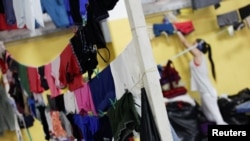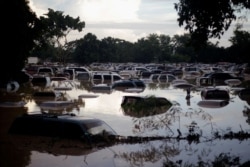International humanitarian teams in Central America need nearly $43 million to provide critical relief to some 646,000 people who were pummeled by two hurricanes, floods and landslides, UNICEF said in a statement Thursday.
Back-to-back Hurricanes Eta and Iota ravaged several Central American countries this month, causing flash floods and mudslides.
"We thought Hurricane Eta was bad, but Hurricane Iota may end up being even worse for children in Central America," said Bernt Aasen, UNICEF regional director for Latin America and the Caribbean.
Eta was the first to hit Central America, causing damage impacting some 4.6 million people in Honduras, Nicaragua, Guatemala, Belize, El Salvador, Costa Rica and Panama.
Hurricane Iota followed a week later, inflicting more devastation. UNICEF says it fears for the health and well-being of nearly 2 million children across the region.
"It's one hurricane after the other, but stronger each time," said Aasen, who warned the worst is yet to come as the "water has yet to recede," but the "humanitarian needs of families and children are immense and keep growing day by day."
Iota, a Category 4 hurricane on a 1-5 scale, leveled entire communities and pulled down trees and electricity poles. So far, 26 deaths have been reported, including 16 in Nicaragua where about 114,000 homes have no power and 47,000 are without water.
UNICEF warned that "children who survived both hurricanes are now at risk of dying from waterborne and other infectious diseases." In a statement, it noted that "cases of hepatitis and malaria have already been reported in some shelters."
UNICEF says it is working to provide humanitarian support to more than 600,000 people in Nicaragua, Belize, Guatemala and Honduras. The organization says continuing rainfall and pandemic-related limitations have hindered access to some affected areas.






